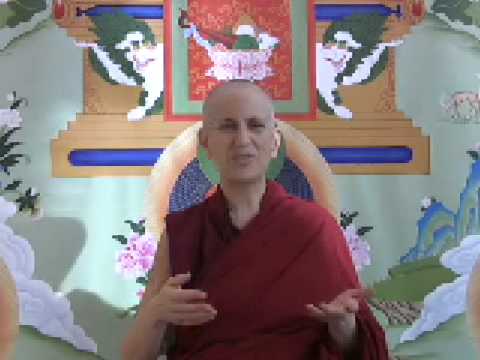Verse 34-3: Delight in giving
Verse 34-3: Delight in giving
Part of a series of talks on the 41 Prayers to Cultivate Bodhicitta from the Avatamsaka Sutra (the Flower Ornament Sutra).
- The idea of “fairness”
- Being taken advantage of
- Checking our motivation when giving
41 Prayers to cultivate bodhicitta: Verse 34-3 (download)
“May all beings be unkind to wrong views.”
This is the prayer of the bodhisattva when seeing someone not repaying kindness.
We’ve been talking about repaying kindness and our feelings about when we see other people repaying or not repaying kindness. We’re often very focused on other people repaying our kindness and get quite fixated with this idea of fairness. I think one of the first things American kids learn, especially if you have siblings, your first vocabulary is, “It’s not fair! He gets to…. She gets to…. It’s not fair.” We continue this all the way through to becoming an adult. In the mind we whine just as much although outside we make it look much nicer. But the mechanism is the same.
This whole thing of fairness: “I did something for them, they’re not repaying my kindness properly, and they should do this and that.” These kinds of thoughts arise very frequently. Along with that is the thought: “They’re taking advantage of me.” That’s another one that we are concerned with. We have our little feelers and sensors. Anything that smacks of somebody taking advantage of me: “Oh Boy, I’m going to jump on that one.” It’s quite interesting. We don’t think of ourselves taking advantage of other people or not repaying their kindness, but we are very focused on them doing that to us.
When I’ve looked at somebody taking advantage of me: “I have done XYZ and they aren’t reciprocating.” I see when I am thinking like that, my motivation for doing XYZ was not a motivation of taking delight in giving. There might have been some delight in giving, but somewhere back there was another little agenda of: “Yes, I feel so good about giving, because I like that person and that’s why I feel good about giving, and they probably like me and they’ll reciprocate because that’s what you are supposed to do.” I see there might have been delight in giving at the beginning, but then I began to add all these strings to it. Or maybe my delight in giving was not so big at the beginning. If you really focus on “I feel so happy about giving,” then you are not focused on, “Are they accepting it, do they appreciate it, are they reciprocating”? Because you are just focused on the giving part of it.
Do you see the change in motivation where the stinkiness of the motivation comes in? Now somebody is going to say, “Well does that mean, that if you are a real practitioner you just do everything for everybody and no matter how they treat you back, you just continue doing it. We erase it from your vocabulary and your conceptual ability. People taking advantage of you. Is it that what it means?” No, it doesn’t exactly mean that. But what you start to do, is you begin to look at, “Is another persons action or attitude something that is benefiting them?”
I might be giving and giving and giving and I don’t feel like I am being taking advantage of. But perhaps the way they are thinking about the situation or the motivations they have for their actions are not virtuous and are not wholesome. Therefore, if I continue giving in this way, it’s not really being fair to the other person because it creates this kind of, I guess you call it dysfunctional relationship or enabling somebody. Something like that. Here you are looking at the situation not in terms of, “I did so much, therefore they should.” But, “Is their attitude and behavior benefiting them?” Sometimes we’re not sure exactly what their attitude is. We need to explore that a little bit and see what they are thinking about.
If we see that somebody is having a mind of “Well I don’t need to do anything because if I just slack off somebody else will come pick up the pieces.” That is not benefiting the other person to allow them to go through their life with that attitude because they’re going to have a lot of unhappiness if they go through life thinking, “Doesn’t matter what I do, somebody will fix it at the end. I don’t have to be responsible for myself, I don’t have to be responsible for everybody else. Somebody will rescue me.” That’s not a good attitude to let somebody continue to live with. As a result, out of compassion for them, then you might stop your giving but you’re not stopping your compassion towards them. You’re stopping some behavior that you’re seeing that although you take delight in it, it’s not something that helps them.
Are you getting what I am saying here? It’s a difficult one. It’s a very difficult one because whenever the thought comes, “They are taking advantage of me,” very often there’s a mixture of the two things in our mind. There’s a mixture of “they should reciprocate,” and there might be something quite validly coming from their side of not having a good attitude. Very often situations of this murky kind of mixture of unwholesomeness is on everybody’s part.
Don’t you love it when samsara is unclear like this? Actually it’s very clear. It’s unwholesome, it stinks. When our mind is so stuck in it, it’s hard. Those situations are difficult. We really need to spend some time and look at, “What’s going on in my mind? What was my motivation for giving to them. What I am expecting? What am I wanting back?” All these kinds of things. And really work stuff out in our mind so that our mind is peaceful. We are not looking what at we are getting out of it. Then also checking up what’s really going on with the other person. Then, if need be, stopping our behavior that looks like generosity but isn’t.
Note: The audio file continues with another topic after the end of this talk.
Venerable Thubten Chodron
Venerable Chodron emphasizes the practical application of Buddha’s teachings in our daily lives and is especially skilled at explaining them in ways easily understood and practiced by Westerners. She is well known for her warm, humorous, and lucid teachings. She was ordained as a Buddhist nun in 1977 by Kyabje Ling Rinpoche in Dharamsala, India, and in 1986 she received bhikshuni (full) ordination in Taiwan. Read her full bio.


